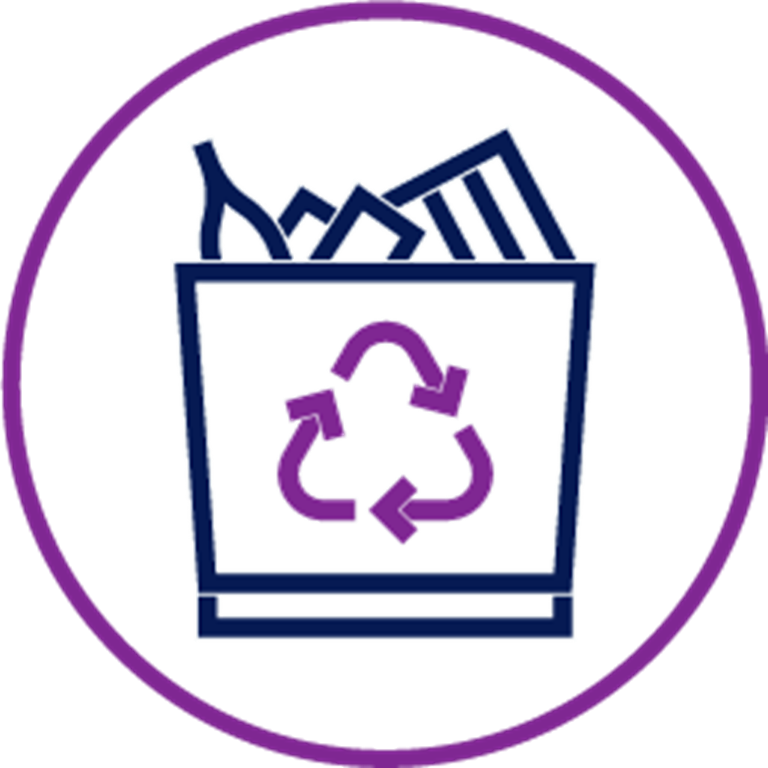-

Opportunity
Reduce waste in landfills and communities
City-wide, Chicagoans recycle less than 10 percent of waste. In the long-term, we aim to flip that paradigm and pursue zero waste by 2040. We have an opportunity to educate students about waste diversion, resulting in not only less waste sent to landfills from our schools and facilities, but in our communities as well. -
Strategy
Our plans to achieve waste reduction include:
- All construction projects are required to create a Waste Management Plan that outlines how the project will achieve 80 percent waste diversion.
- Provide resources and guidance to facility managers and school administrators for waste management
- Develop waste and recycle strategies for athletic events and fields
- Seek grants and other support for purchase of compost equipment
- Engage students and partner organizations to conduct food waste audits and develop food waste diversion plans
- Right size waste management equipment
- Promote reuse of furniture, equipment, and supplies through the CPS Warehouse
City-wide, Chicagoans recycle less than 10 percent of waste. In the long-term, we aim to flip that paradigm and pursue zero waste by 2040.
Program Details
While we maintain and plan on expanding a number of waste, recycling, and composting programs, previous efforts show that even the seemingly small ideas can have an impact. These efforts have included removing straws from utensil packets and obtaining recycling bins for every classroom. Even milk carton recycling is implemented at some schools.
Achieving 80 percent diversion is our goal, and we will take strategic steps to achieve it. Along the way we will participate in regular meetings facilitated by the Chicago Sustainability Task Force to share best practices and lessons learned between the Field Museum, Cook County, and the City of Chicago.
First, we will address construction and demolition (C&D) waste, which is a major source of waste, much of which is recyclable. Our new construction and renovation projects are committed to reducing this impact by aligning with C&D diversion goals in LEED standards and the Chicago Sustainable Development Policy.
Next, we address school waste, which is fairly consistent, and can be addressed through composting and recycling. The primary materials that can be diverted include commingled recyclables and food scraps as compost. In 2024, net recycling rates (in volume) for CPS was 24 percent.
Composting
Between 2015 and 2021, with support from Seven Generations Ahead and Lakeshore Recycling Systems, the CPS composting program contributed to an improved diversion rate from 22 percent in 2015 to almost 50 percent in 2021 across 14 schools. While the program was suspended in 2020 due to the COVID-19 pandemic, in 2022, an additional 10 schools were added to the program.
The program includes consultations with composting experts and discussions with Lakeshore Recycling Systems on hauling practices. The program also includes training for students on the collection and separation of recyclables and compost at participating schools. Students are also expected to actively participate in the program both in the cafeteria and in the classroom.
CPS Warehouse
We operate a warehouse program that collects and redistributes unused equipment, furniture, educational materials, and other assets for district schools and administrative offices. The five- year-old program operates out of a 284,000 square foot warehouse and provides free delivery and pick-up of excess items for redistribution within CPS.
The CPS warehouse hosts a quarterly Furniture Fair as part of the re-use program. The program allows for schools to shop for excess CPS inventory to identify items that can fill school needs, such as textbooks and furniture or IT products. The program attracts up to 125 schools each quarter.
Resources
Energy and Sustainability Programs
View more sustainability programs that are helping to reduce consumption of energy and increase the renewable resources used throughout the district.